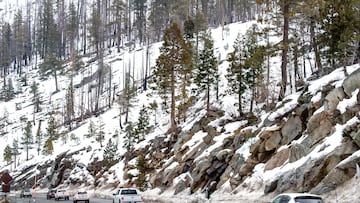Which states are most threatened by snow and tornado danger in March?
Winter weather continues to wreak havoc in various parts of the US. Here are the states facing a threat of snow as well as tornadoes that will hit soon.

On Wednesday, a powerful storm unleashed heavy snow, tornadoes and massive hail in central of the United States and such conditions are expected to continue for the next few days.
According to the National Weather Service (NWS), heavy snow will continue over Colorado through Thursday before it begins to taper off overnight and slowly on Friday.
Meanwhile, severe storms are forecast in some parts of the Plains and the Mississippi Valley, which will extend into the Midwest. The strongest storms will be felt in northeastern Kansas and western Missouri, as well as parts of Nebraska and Iowa.
Beginning tonight, surges of heavy snow will affect the higher elevations of the Southwest region and Four Corners. This includes parts of the Mogollon Rim north to the southern Utah and San Juan Mountains.
Tornado warning in the US
An area stretching from Texas to Illinois and Indiana will also have a risk of severe thunderstorms capable of producing damaging wind gusts, hail and some tornadoes.
The risk of severe thunderstorms is highest in parts of Oklahoma, Arkansas and Missouri, as is the possibility of tornadoes. The overall threat of severe storms will decrease on Friday.
For Thursday, the NWS issued a Tornado Watch for parts of Indiana and Ohio until 12:00 a.m. CT. Some parts of Illinois also have a tornado watch today.
READ ALSO: Footage shows devastating tornado in Ohio
How to make an emergency kit for a snow storm
The NWS recommends that before the storm hits, you should make sure your home, office, and vehicles have supplies you may need. You should also make sure farm animals and pets are safe and have important supplies.
The main concerns during a winter storm are loss of heat, power, phone service, and shortage of supplies, so you should be ready with the following items at home:
- Flashlight and extra batteries.
- Portable radio with batteries to receive emergency information
- Additional food and water, such as dried fruit, nuts, granola bars, and other foods that do not require cooking or refrigeration.
- Medicines
- Baby items such as diapers and formula
- First aid supplies
- Heating fuel
- Emergency heat source: fireplace, wood stove, or adequately ventilated space heater to prevent fire
- Functional fire extinguisher and smoke alarm
- Extra food and warm shelter for pets
- Outdoor generator
What to do during a tornado
Acting quickly is key to staying safe and minimizing damage and injuries, so it is important to follow NWS guidelines:
- Stay prepared for the weather: continue to listen to local news or NOAA weather radio to stay up to date on tornado watches and warnings.
- At home: If you are under a tornado warning, go to your basement, safe room, or an interior room away from windows. Don't forget your pets.
- At your workplace or school: Follow your tornado drill and proceed to your tornado shelter location quickly and calmly. Stay away from windows and don't go to large, open rooms.
- Outside: Seek shelter inside a sturdy building immediately if a tornado approaches. Sheds and storage facilities are not safe. Neither is a mobile home or a tent.
- In a vehicle: Being in a vehicle during a tornado is not safe. It is best to drive to the nearest shelter. If you cannot reach safe shelter, get into your car and cover your head, or abandon your car and seek shelter in a low area, such as a ditch or ravine.





